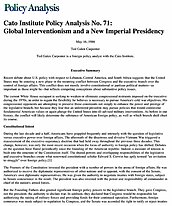The current White House occupant is seeking to weaken or eliminate congressional restraints imposed on the executive during the 1970s, in order to regain the flexibility he believes is necessary to pursue America’s cold war objectives. His congressional opponents are attempting to preserve those constraints not simply to enhance the power and prestige of the legislative branch, but because they fear that an unfettered president may pursue policies that would contravene fundamental American values or again plunge the United States into ill-advised military interventions. As before in our history, the conflict will likely determine the substance of American foreign policy, as well as which branch shall chart its course.
Global Interventionism and a New Imperial Presidency
Recent debate about U.S. policy with respect to Lebanon, Central America, and South Africa suggests that the United States may be entering a new phase in the recurring conflict between Congress and the executive branch over the control of foreign affairs. This conflict does not merely involve constitutional or partisan political matters–as important as those might be–but reflects competing conceptions about substantive policy issues.

This work is licensed under a Creative Commons Attribution-NonCommercial-ShareAlike 4.0 International License.

